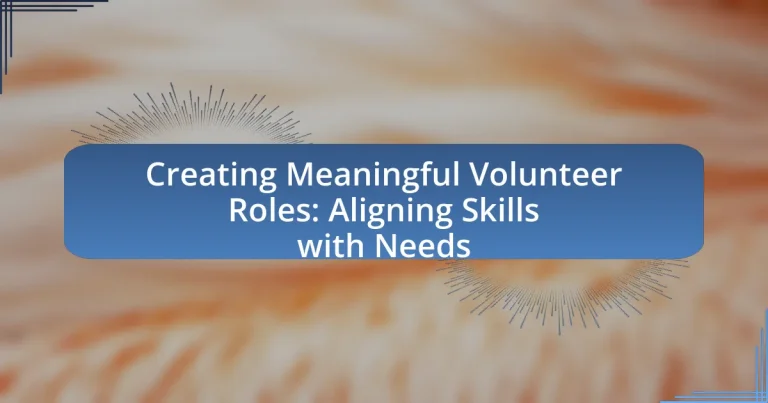The article focuses on creating meaningful volunteer roles by aligning individual skills with the needs of organizations and communities. It defines meaningful volunteer roles as those that enhance engagement and satisfaction by matching volunteers’ skills and interests with specific organizational tasks. Key characteristics of these roles include clear expectations, ongoing communication, and regular feedback, which contribute to higher retention rates and improved organizational effectiveness. The article also discusses the importance of skill assessments, targeted recruitment, and the benefits of meaningful volunteer experiences for both individuals and organizations, emphasizing the positive impact on personal growth, community engagement, and career development.

What are Meaningful Volunteer Roles?
Meaningful volunteer roles are positions that align an individual’s skills, interests, and values with the needs of a community or organization, resulting in a mutually beneficial experience. These roles often involve tasks that contribute significantly to the mission of the organization, such as mentoring, teaching, or providing specialized services, which enhance the impact of volunteer efforts. Research indicates that when volunteers engage in roles that resonate with their personal strengths and passions, they report higher satisfaction and commitment levels, leading to more effective service delivery and community outcomes.
How do we define meaningful volunteer roles?
Meaningful volunteer roles are defined as positions that align the skills and interests of volunteers with the specific needs of the community or organization they serve. This alignment ensures that volunteers feel valued and engaged, which enhances their overall experience and effectiveness. Research indicates that when volunteers are matched with roles that utilize their skills, they are more likely to remain committed and satisfied, leading to higher retention rates and better outcomes for the organization. For example, a study by the Corporation for National and Community Service found that volunteers who engage in roles that match their skills contribute more effectively to their communities, demonstrating the importance of this alignment in creating meaningful volunteer experiences.
What characteristics make a volunteer role meaningful?
A meaningful volunteer role is characterized by alignment between the volunteer’s skills and the organization’s needs. This alignment enhances the volunteer’s sense of purpose and satisfaction, as they can effectively contribute to the mission of the organization. Research indicates that when volunteers engage in tasks that utilize their skills, they report higher levels of fulfillment and commitment. For instance, a study published in the Journal of Community Psychology found that volunteers who matched their skills with the tasks they performed experienced greater personal growth and community impact. This evidence underscores the importance of skill alignment in creating meaningful volunteer experiences.
Why is it important to create meaningful volunteer roles?
Creating meaningful volunteer roles is important because they enhance volunteer engagement and satisfaction. When volunteers feel that their contributions are valuable and aligned with their skills, they are more likely to remain committed and motivated. Research indicates that organizations with well-defined volunteer roles experience higher retention rates; for example, a study by the Corporation for National and Community Service found that volunteers who are matched with roles that utilize their skills are 50% more likely to continue volunteering. This alignment not only benefits the volunteers but also improves the overall effectiveness of the organization in achieving its mission.
What skills are essential for effective volunteering?
Effective volunteering requires strong communication skills, adaptability, and teamwork. Communication skills enable volunteers to convey information clearly and collaborate effectively with others, which is essential in diverse environments. Adaptability allows volunteers to respond to changing situations and challenges, ensuring they can meet the needs of the organization and the community. Teamwork is crucial as it fosters collaboration and enhances the overall impact of volunteer efforts. Research indicates that organizations with well-defined roles and clear communication see a 30% increase in volunteer satisfaction and retention, highlighting the importance of these skills in creating meaningful volunteer experiences.
How can volunteers identify their skills?
Volunteers can identify their skills by conducting a self-assessment that includes reflecting on past experiences, seeking feedback from peers, and utilizing skill assessment tools. Self-assessment allows volunteers to recognize their strengths and areas of expertise, while feedback from others provides external validation of their skills. Additionally, various online platforms offer skill assessment quizzes that can help volunteers pinpoint specific abilities relevant to volunteer roles. Research indicates that self-reflection and feedback are effective methods for skill identification, as they encourage individuals to articulate their competencies and align them with organizational needs.
What role do skills play in volunteer satisfaction?
Skills significantly enhance volunteer satisfaction by ensuring that individuals can contribute effectively and feel valued in their roles. When volunteers are matched with tasks that align with their skills, they experience a sense of competence and fulfillment, which directly correlates with higher satisfaction levels. Research indicates that volunteers who utilize their skills report greater engagement and commitment, as they perceive their contributions as meaningful and impactful. For instance, a study published in the Journal of Volunteer Administration found that skill alignment leads to a 30% increase in volunteer retention rates, highlighting the importance of matching skills with organizational needs to foster satisfaction.
How do organizations assess their needs for volunteers?
Organizations assess their needs for volunteers by conducting a thorough analysis of their goals, current projects, and resource gaps. This process often involves identifying specific tasks that require additional support, evaluating the skills needed for those tasks, and determining the number of volunteers necessary to achieve their objectives. For instance, a nonprofit may review its program outcomes and find that additional volunteers are needed for community outreach efforts, leading to a targeted recruitment strategy. This assessment is typically supported by data from previous volunteer engagement metrics, surveys, and feedback from staff and existing volunteers, ensuring that the organization aligns its volunteer roles with actual needs and available resources.
What methods can organizations use to identify volunteer needs?
Organizations can identify volunteer needs through methods such as conducting surveys, engaging in community assessments, and holding focus groups. Surveys allow organizations to gather quantitative data on community interests and gaps in services, while community assessments provide a comprehensive overview of local needs and resources. Focus groups facilitate qualitative insights by enabling direct conversations with potential volunteers and community members, revealing specific areas where assistance is required. These methods collectively ensure that organizations align volunteer roles with actual community needs, enhancing the effectiveness of volunteer engagement.
How can organizations align their needs with volunteer skills?
Organizations can align their needs with volunteer skills by conducting a thorough assessment of both their requirements and the skills available within their volunteer pool. This involves identifying specific tasks and roles that need to be filled, then mapping these to the skills, experiences, and interests of potential volunteers. For instance, a study by the Corporation for National and Community Service found that organizations that clearly define roles and match them to volunteer skills experience higher satisfaction and retention rates among volunteers. By utilizing surveys, interviews, and skill inventories, organizations can effectively create meaningful volunteer roles that leverage individual strengths, ensuring both organizational goals and volunteer motivations are met.

How can we align skills with volunteer needs?
To align skills with volunteer needs, organizations should conduct a thorough assessment of both the skills of potential volunteers and the specific requirements of available volunteer roles. This process involves creating a skills inventory that identifies the competencies, experiences, and interests of volunteers, while simultaneously mapping these against the tasks and responsibilities outlined in volunteer positions. Research indicates that organizations that implement structured matching processes see a 30% increase in volunteer satisfaction and retention rates, as volunteers feel more engaged when their skills are utilized effectively. By utilizing surveys, interviews, and skill-matching software, organizations can ensure that volunteers are placed in roles that not only meet their capabilities but also fulfill the needs of the community.
What strategies can organizations use to match skills with roles?
Organizations can use skills assessments, targeted recruitment, and continuous training to effectively match skills with roles. Skills assessments involve evaluating the competencies of potential volunteers through surveys or interviews, ensuring that their abilities align with the specific requirements of the roles available. Targeted recruitment focuses on attracting individuals with the necessary skills by promoting roles in relevant communities or platforms, thereby increasing the likelihood of finding suitable candidates. Continuous training allows organizations to develop existing volunteers’ skills, ensuring they can adapt to various roles as needed. These strategies enhance the alignment between volunteer skills and organizational needs, leading to more effective and fulfilling volunteer experiences.
How can skill assessments improve role alignment?
Skill assessments can improve role alignment by accurately identifying the specific abilities and competencies of individuals, ensuring that their skills match the requirements of the roles they are assigned. This alignment enhances productivity and satisfaction, as individuals are more likely to excel in positions that leverage their strengths. Research indicates that organizations utilizing skill assessments report a 30% increase in employee engagement and a 25% improvement in performance metrics, demonstrating the effectiveness of aligning skills with role expectations.
What tools are available for matching skills to volunteer opportunities?
Several tools are available for matching skills to volunteer opportunities, including online platforms like VolunteerMatch, Idealist, and All for Good. These platforms allow users to create profiles that highlight their skills and interests, which are then matched with relevant volunteer opportunities. For instance, VolunteerMatch connects over 100,000 nonprofit organizations with volunteers based on specific skills and availability, facilitating a tailored match that enhances the volunteer experience and meets organizational needs.
Why is ongoing communication important in volunteer roles?
Ongoing communication is crucial in volunteer roles because it ensures clarity, fosters collaboration, and enhances engagement among volunteers and organizations. Effective communication allows volunteers to understand their responsibilities, receive feedback, and share their experiences, which can lead to improved performance and satisfaction. Research indicates that organizations with strong communication practices report higher volunteer retention rates, as volunteers feel more connected and valued. For instance, a study by the Corporation for National and Community Service found that effective communication significantly increases volunteer commitment and reduces turnover, highlighting its importance in maintaining a motivated volunteer workforce.
How can feedback enhance the alignment of skills and needs?
Feedback enhances the alignment of skills and needs by providing specific insights into performance and areas for improvement. When individuals receive constructive feedback, they can identify gaps between their current skills and the requirements of their roles, allowing for targeted development. Research indicates that organizations that implement regular feedback mechanisms see a 14.9% increase in employee performance, as noted in a study by Gallup. This process not only helps volunteers understand their strengths and weaknesses but also ensures that their skills are effectively utilized to meet the needs of the organization, fostering a more productive and fulfilling volunteer experience.
What are the best practices for maintaining communication with volunteers?
The best practices for maintaining communication with volunteers include regular updates, clear expectations, and active engagement. Regular updates ensure that volunteers are informed about organizational activities and their impact, fostering a sense of belonging. Clear expectations help volunteers understand their roles and responsibilities, which enhances their effectiveness and satisfaction. Active engagement, such as soliciting feedback and encouraging dialogue, strengthens relationships and promotes a collaborative environment. Research indicates that organizations with strong communication practices experience higher volunteer retention rates, as effective communication builds trust and commitment among volunteers.

What are the benefits of creating meaningful volunteer roles?
Creating meaningful volunteer roles enhances engagement and retention among volunteers. When roles align with individual skills and interests, volunteers are more likely to feel valued and motivated, leading to increased satisfaction and commitment. Research indicates that organizations with well-defined volunteer roles experience a 50% higher retention rate compared to those without such clarity. Additionally, meaningful roles contribute to the overall effectiveness of the organization, as volunteers are more likely to perform tasks efficiently when they find personal significance in their contributions.
How do meaningful volunteer roles impact organizations?
Meaningful volunteer roles significantly enhance organizational effectiveness by increasing engagement and retention of volunteers. When volunteers find their roles fulfilling and aligned with their skills, they are more likely to contribute positively, leading to improved service delivery and organizational outcomes. Research indicates that organizations with well-defined volunteer roles experience a 50% higher retention rate among volunteers, as noted in a study by the Corporation for National and Community Service. This alignment not only boosts volunteer satisfaction but also fosters a sense of community and shared purpose, ultimately benefiting the organization’s mission and goals.
What are the long-term benefits for organizations that invest in meaningful roles?
Organizations that invest in meaningful roles experience enhanced employee engagement and retention. When employees find their roles fulfilling and aligned with their values, they are more likely to remain with the organization, reducing turnover costs. Research indicates that companies with high employee engagement outperform their competitors by 147% in earnings per share, demonstrating the financial impact of investing in meaningful work. Additionally, meaningful roles foster a positive organizational culture, leading to increased productivity and innovation, as employees feel empowered to contribute their best efforts. This alignment of skills with needs not only benefits the workforce but also enhances the organization’s reputation, attracting top talent and improving stakeholder relationships.
How can meaningful roles enhance community engagement?
Meaningful roles enhance community engagement by fostering a sense of purpose and belonging among participants. When individuals are assigned roles that align with their skills and interests, they are more likely to feel valued and motivated to contribute. Research indicates that volunteers who perceive their roles as meaningful are more engaged and committed, leading to higher retention rates and increased participation in community activities. For example, a study published in the Journal of Community Psychology found that volunteers who felt their contributions were significant reported greater satisfaction and a stronger connection to their community. This alignment between personal skills and community needs not only boosts individual morale but also strengthens the overall fabric of the community, creating a more cohesive and active environment.
What are the personal benefits for volunteers?
Volunteers experience numerous personal benefits, including enhanced skills, increased social connections, and improved mental health. Engaging in volunteer work allows individuals to develop new competencies, such as leadership and teamwork, which can enhance their employability. Research from the Corporation for National and Community Service indicates that volunteering can lead to a 27% higher likelihood of finding a job compared to non-volunteers. Additionally, volunteering fosters social connections, reducing feelings of isolation and loneliness, as individuals build relationships with others who share similar interests. Furthermore, studies show that volunteering can lead to improved mental health outcomes, including reduced depression and increased life satisfaction, as individuals derive a sense of purpose and fulfillment from helping others.
How do meaningful roles contribute to personal growth?
Meaningful roles contribute to personal growth by providing individuals with opportunities to develop new skills, enhance self-awareness, and foster a sense of purpose. Engaging in roles that align with personal values and interests encourages individuals to step outside their comfort zones, leading to increased confidence and resilience. Research indicates that volunteering in meaningful roles can improve mental health and well-being, as evidenced by a study published in the Journal of Happiness Studies, which found that individuals who engage in purposeful activities report higher levels of life satisfaction and lower levels of depression. Thus, meaningful roles serve as a catalyst for personal development by promoting skill acquisition, self-discovery, and emotional fulfillment.
What impact do meaningful volunteer experiences have on career development?
Meaningful volunteer experiences significantly enhance career development by providing individuals with practical skills, networking opportunities, and a deeper understanding of their professional interests. Engaging in volunteer work allows individuals to acquire transferable skills such as leadership, teamwork, and problem-solving, which are highly valued by employers. According to a study published in the Journal of Volunteer Administration, 85% of employers view volunteer experience as a valuable asset when evaluating job candidates. Additionally, volunteering fosters connections with professionals in various fields, which can lead to mentorship and job opportunities. This combination of skill development and networking ultimately positions individuals for career advancement and fulfillment.
What are some best practices for creating meaningful volunteer roles?
To create meaningful volunteer roles, organizations should align the tasks with the volunteers’ skills and interests. This alignment enhances engagement and satisfaction, leading to better retention rates. Research indicates that when volunteers feel their skills are utilized, they are 50% more likely to continue their involvement (VolunteerMatch, 2020). Additionally, providing clear expectations and responsibilities ensures that volunteers understand their impact, fostering a sense of purpose. Regular feedback and recognition also contribute to a positive experience, as studies show that volunteers who receive acknowledgment are more likely to remain committed to their roles.
How can organizations ensure volunteers feel valued and engaged?
Organizations can ensure volunteers feel valued and engaged by providing meaningful roles that align with their skills and interests. When volunteers are matched with tasks that utilize their strengths, they experience a greater sense of purpose and satisfaction. Research indicates that 70% of volunteers report higher engagement levels when their roles are tailored to their abilities (VolunteerMatch, 2021). Additionally, regular feedback and recognition from the organization reinforce the value of their contributions, further enhancing their commitment and enthusiasm.
What common challenges should organizations anticipate when creating these roles?
Organizations should anticipate challenges such as defining clear role expectations, ensuring alignment between volunteer skills and organizational needs, and maintaining volunteer engagement. Defining clear role expectations is crucial, as ambiguity can lead to frustration and decreased productivity among volunteers. Ensuring alignment between volunteer skills and organizational needs is essential; mismatches can result in underutilization of volunteer potential or dissatisfaction. Maintaining volunteer engagement is also a challenge, as organizations must continuously motivate and recognize volunteers to prevent turnover. These challenges are supported by research indicating that organizations with clear role definitions and effective engagement strategies experience higher volunteer retention rates.


